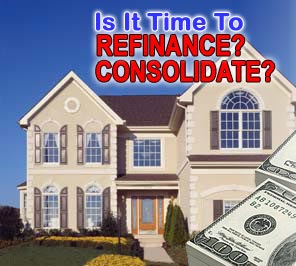(ThyBlackMan.com) Every commercial on the TV, internet, and radio is talking about how easy it is to refinance your current mortgage and how helpful it will be to have lower payments due to interest rates being so low. Refinancing means more business for financial institutions, insurance carriers (home, title, etc.), and various other industries that profit from the paperwork that comes with any new mortgage. That’s great for them, but let’s makes sure that refinancing really is your best option.
Should You Refinance?
You’ll have to take into account your current credit scores, how much equity you have in your home, how long you want to stay in the home, if your current mortgage has a prepayment penalty, how long you’d like to take to pay off the new mortgage, and how much money you have available for closing costs.  Take a look at this list to determine if refinancing is the best option for you:
Take a look at this list to determine if refinancing is the best option for you:
Interest rate – Take a look at your current mortgage papers to find the interest rate you’re paying. A change in one percentage point over the lifetime of a 30 year mortgage could mean the difference of thousands of dollars.
Prepayment penalty – While you have those loan papers out, see if you have a prepayment penalty. If you don’t have one, then refinancing will be a little cheaper. If you do have one, then on top of paying off the original loan you’ll also have to pay a, sometimes hefty, fee to get out of the original mortgage. Interest payments are how the financial institution makes money; so many mortgages have these clauses. If you aren’t paying your mortgage off over time, they don’t get to collect those interest payments.
Jumbo loan – If you originally took out a jumbo loan (a loan of more than $417,000) and now have enough equity to apply for a smaller loan, then refinancing might be a good option.
Horizon – Depending on how much longer you think you’ll be in your home, refinancing may or may not be worth the hassle and closing costs. If you’ll be in your home three years or less then you probably will pay out more money in closing costs than you saved in payments. Refinancing with fewer than three or more years in a home may not be a good move.
Amortization – When you refinance your mortgage you’re basically taking out a new mortgage. It’s like starting from the beginning. If you had a 30 year mortgage and you’re going to refinance in year 12, if you want to make sure your mortgage will be paid off in the 30 original years you wanted to pay it off in, you’ll need to get a mortgage with fewer than 18 years to pay it off. When refinancing you’ll have to look at your timeframe and decide if you want to
a) start all over again with a new mortgage and longer timeframe or
b) take out a mortgage with a shorter timeframe and a little bit higher payments.
What You’ll Need to Refinance
If you decide to refinance you’ll have to consider how much equity you have, what your credit scores are, and how much cash you have available for closing costs:
Equity – To qualify for a refinance you’ll have to have enough equity in your current home. How much equity depends on what kind of refinance you’d like to get and which financial institution you’re working with.
Good credit scores – Thought getting refinanced is easier than getting an original mortgage, you’ll still need good credit scores. You can check your credit scores before you apply for a refinance with no negative repercussions. Make sure that your reports and scores are accurate and try to pay off as much debt as possible to get the best interest rate possible.
Closing costs – Just like with your original mortgage, there will be closing costs. Don’t be fooled by companies that offer you “no closing costs” they have to make money too. What they mean is that the closing costs have been rolled into the new mortgage. You’ll either pay now or pay later, but you will pay.
As you start comparing offers from different financial institutions, it’s going to be important that you get, and understand, the PIL (principle amount, interest rate, and length of loan) of each offer.
The best time to refinance is when you have something to gain from it. When you have the equity, credit scores, closing costs to significantly lower your payments or to lower the overall amount of interest that you’ll pay back over time then go for it.
Written By Shay Olivarria
Official website; http://www.BiggerThanYourBlock.com

















Hi, i think thst i saw you visited my web site thus i came to “return the favor”.I’m trying to find things to
improve my site!I suppose its ok to use a few of
your ideas!!